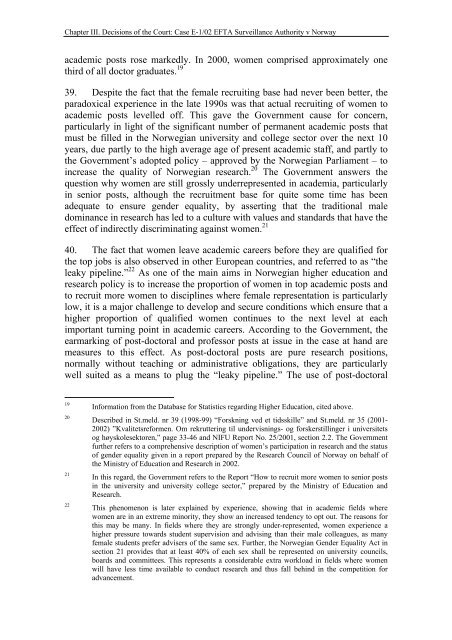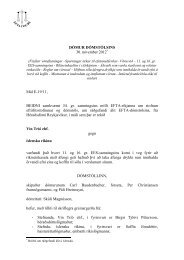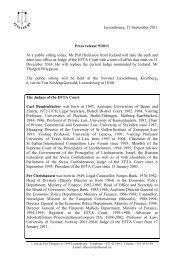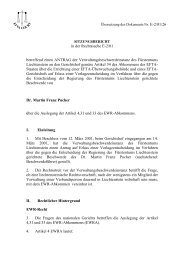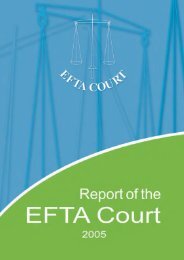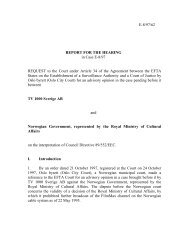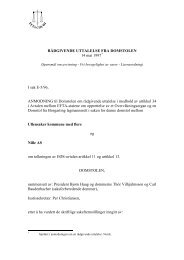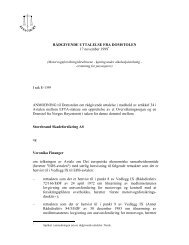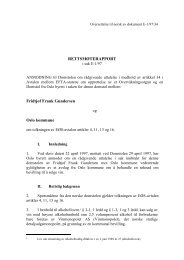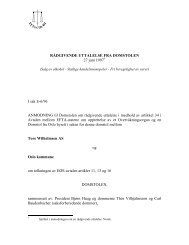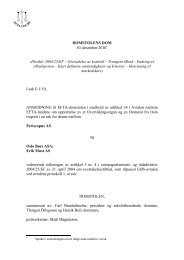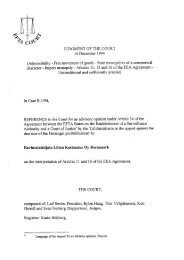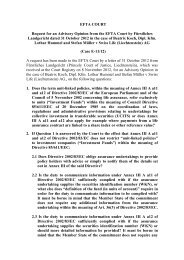Report 2003 - EFTA Court
Report 2003 - EFTA Court
Report 2003 - EFTA Court
- TAGS
- efta
- www.eftacourt.int
You also want an ePaper? Increase the reach of your titles
YUMPU automatically turns print PDFs into web optimized ePapers that Google loves.
Chapter III. Decisions of the <strong>Court</strong>: Case E-1/02 <strong>EFTA</strong> Surveillance Authority v Norway<br />
academic posts rose markedly. In 2000, women comprised approximately one<br />
third of all doctor graduates. 19<br />
39. Despite the fact that the female recruiting base had never been better, the<br />
paradoxical experience in the late 1990s was that actual recruiting of women to<br />
academic posts levelled off. This gave the Government cause for concern,<br />
particularly in light of the significant number of permanent academic posts that<br />
must be filled in the Norwegian university and college sector over the next 10<br />
years, due partly to the high average age of present academic staff, and partly to<br />
the Government’s adopted policy – approved by the Norwegian Parliament – to<br />
increase the quality of Norwegian research. 20 The Government answers the<br />
question why women are still grossly underrepresented in academia, particularly<br />
in senior posts, although the recruitment base for quite some time has been<br />
adequate to ensure gender equality, by asserting that the traditional male<br />
dominance in research has led to a culture with values and standards that have the<br />
effect of indirectly discriminating against women. 21<br />
40. The fact that women leave academic careers before they are qualified for<br />
the top jobs is also observed in other European countries, and referred to as “the<br />
leaky pipeline.” 22 As one of the main aims in Norwegian higher education and<br />
research policy is to increase the proportion of women in top academic posts and<br />
to recruit more women to disciplines where female representation is particularly<br />
low, it is a major challenge to develop and secure conditions which ensure that a<br />
higher proportion of qualified women continues to the next level at each<br />
important turning point in academic careers. According to the Government, the<br />
earmarking of post-doctoral and professor posts at issue in the case at hand are<br />
measures to this effect. As post-doctoral posts are pure research positions,<br />
normally without teaching or administrative obligations, they are particularly<br />
well suited as a means to plug the “leaky pipeline.” The use of post-doctoral<br />
19<br />
Information from the Database for Statistics regarding Higher Education, cited above.<br />
20<br />
Described in St.meld. nr 39 (1998-99) “Forskning ved et tidsskille” and St.meld. nr 35 (2001-<br />
2002) ”Kvalitetsreformen. Om rekruttering til undervisnings- og forskerstillinger i universitets<br />
og høyskolesektoren,” page 33-46 and NIFU <strong>Report</strong> No. 25/2001, section 2.2. The Government<br />
further refers to a comprehensive description of women’s participation in research and the status<br />
of gender equality given in a report prepared by the Research Council of Norway on behalf of<br />
the Ministry of Education and Research in 2002.<br />
21 In this regard, the Government refers to the <strong>Report</strong> “How to recruit more women to senior posts<br />
in the university and university college sector,” prepared by the Ministry of Education and<br />
Research.<br />
22 This phenomenon is later explained by experience, showing that in academic fields where<br />
women are in an extreme minority, they show an increased tendency to opt out. The reasons for<br />
this may be many. In fields where they are strongly under-represented, women experience a<br />
higher pressure towards student supervision and advising than their male colleagues, as many<br />
female students prefer advisers of the same sex. Further, the Norwegian Gender Equality Act in<br />
section 21 provides that at least 40% of each sex shall be represented on university councils,<br />
boards and committees. This represents a considerable extra workload in fields where women<br />
will have less time available to conduct research and thus fall behind in the competition for<br />
advancement.


